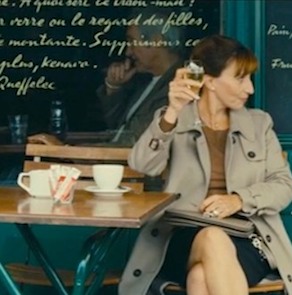Film: L’Art d’Aimer: The Art of Love With Official Movie Trailer
- SUBSCRIBE
- ALREADY SUBSCRIBED?
BECOME A BONJOUR PARIS MEMBER
Gain full access to our collection of over 5,000 articles and bring the City of Light into your life. Just 60 USD per year.
Find out why you should become a member here.
Sign in
Fill in your credentials below.
L’Art d’Aimer ~ The Art of Love
Emmanuel Mouret’s new movie could serve as a companion piece to Elaine Sciolino’s La Seduction, which details how the French turn love and life in general into both a game and an art. L’Art d’Aimer (The Art of Love) is an exploration of how Parisians play games with their emotional lives. Does this manipulation of life really constitute an art? It might, if you also consider a well-appointed apartment, a color-coordinated dish, or a silk scarf and blazer worn as winter apparel as artistic.
At any rate, l’Art d’Aimer is one of the most elegant concoctions in recent memory. The acting, directing, and writing are effortlessly assured. The art direction and production design are like one perfectly-dressed Parisian shop window after another. Sequences show postcard-beautiful Paris, but lived in and worked in (and, of course, loved in) by the discreetly charmed bourgeoisie, not just schlepping grounds for us mere mortals.
L’Art d’Aimer tells several different stories, which don’t interlock for the most part, though two of them will intersect for the climax. Part of the film’s elegance is its very asymmetry: the stories aren’t drearily uniform and equal. One narrative begins and ends with no development. Another is developed like a multi-part story. Still others have episodes interspersed throughout the film. Titles introduce the sections, some clever and literary, while others are just arch (“Patience, Patience”). The other unifying device is the voice-over narration by the actor Philippe Torreton. Torreton has such a striking physical presence one forgets his strong, mellifluous voice, which charms us into a suspension of our disbelief in the movie’s adult fairytale world.
The stories in the movie are about persons deflecting love, or complicating it. In one young couple’s relationship, the woman is permitted to sleep with a co-worker, provided no love is involved (especially as he’s being transferred overseas). Naturally, the co-worker doesn’t go along (and announces he’s staying in Paris, besides).

Another story concerns a pair of woman friends, commiserating over the extended sexual hiatus of one of them. The other offers her partner as a sort of therapy, and this is sensibly refused. But the lonely lady has yet another friend with a nifty idea, for fobbing off a man with an inconvenient crush on her: she schedules a tryst in a hotel on condition that the room is completely dark. In such circumstances, the loveless friend can be substituted. It works out perfectly, except that the two in-the-dark (in every sense of the word) lovers only appreciate each other in the dark.
 In another story, a love-starved Parisian named Achille (François Cluzet, in perhaps the film’s best performance) hits it off with his kooky but lovely neighbor. Except that she insists on physical consummation of their adventure being entirely natural—and each time they meet artifice intrudes.
In another story, a love-starved Parisian named Achille (François Cluzet, in perhaps the film’s best performance) hits it off with his kooky but lovely neighbor. Except that she insists on physical consummation of their adventure being entirely natural—and each time they meet artifice intrudes.


All of this might sound silly, and it probably is. And it’s probably not very representative. The movie isn’t about France (despite a few splendid sequences in beautiful countryside), but Paris. Not working-class Paris, or student Paris, or bohemian Paris, or even “bobo” Paris, but old-fashioned bourgeois Paris. For a certain set, aesthetics and ratiocination, even more than seduction, invade every area of life. This might be a royal mistake in one’s emotional life, but as one of the characters might well respond, crème brulée, among other culinary classics, was the result of a mistake.

L’Art d’Aimer derives loosely, at least in spirit, from Roman poet Ovid’s Ars Amatoria, a book that was hugely influential for centuries. The movie preserves its tongue-in-cheek style, as well as an explicit attitude to sex. Actually, parts of Ovid are much raunchier, and told from a male perspective. L’Art d’Aimer is ultimately more about love than sex, and if anything has a more feminine perspective. Class concerns are also very present, by their very absence: none of the individuals or couples in the film is confronted with the material side of relationships, what it means from a monetary point of view to come together or come apart.
The problem with this is that when the film’s Parisians play games with each other it isn’t for keeps. There’s no pain, so not much gain. A character might be miffed, surprised, disappointed, but then moves on (or moves back) as blithely as ever. L’Art d’Aimer takes the ingredients of Eric Rohmer’s sophisticated films and turns them into light, delicate, delicious puff pastry. It’s deliciously French, on one level. But ironically the succession of sketches without much development brings to mind not so much Rohmer as that old 1960s sitcom, Love American Style.
View the official trailer with English subtitles.
Production: Moby Dick Films
Distribution: Pyramide Distribution (France)

Photo credits: ©Emmanuel Mouret
Dimitri Keramitas is a Paris-based film reviewer who covers the latest French film releases for BonjourParis every other week. Click on his name to read his past reviews published here.
Subscribe for free weekly newsletters with subscriber-only content.
BonjourParis has been a leading online France travel and French lifestyle site since 1995.
Top 100 France-themed books & more: Readers’ Favorites.
Update your movie & book library….click on image for details.
Thank you for using our link to Amazon.com…your purchases support our free site.









